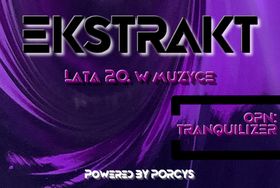
W kolejnym odcinku oglądamy pod mikroskopem rewelacyjny album Daniela Lopatina.

Techno in Poland has quickly walked along the path that hadn't been previously trod by any other music genre. Starting as a shadowy object of the '90s adolescent' nostalgia, abandoned in favour of the boom of trip-hop, rave, house and other great dance music styles of the era, over the next few years it gained quite a recognition and became the most effective way of expression for young talents born around the golden age of the Detroit sound. Polish techno has enjoyed a rich history (you can tell by looking up when exactly the country's most outstanding record labels, such as mik.musik and Recognition, were founded), but it's in recent years that the style has been established as a vanguard of our experimental and alternative electronic music scene - just like UK bass was representative for its more melodic pockets some time ago.
What's interesting is that Natalia Zamilska's debut album is also influenced by bass-driven music, and it's supposedly the first outright domestic hype of this aesthetic. The vast of work had been done by "Quarrel", a lead single that both outlined the stylistic frame of the LP and upgraded the techno subculture to a potential lifestyle phenomenon that appeals to a wider audience, flourishing outside of kith and kin circles. Apparently, Zamilska's case brings some sort of a crowning to all the previous efforts of Polish techno labels and artists like Lutto Lento, We Will Fail or RSS B0YS, who have consistently built their independent audience; however, this breakthrough is not accidental at all.
Zamilska aggregates lots of trendy and popular stylistic patterns associated with techno, and what's more, she operates with these quite simple resources so fancily that she is able to create a very distinct sound that makes her stand out from the crowd. The majority of her album is dominated by dynamic hi-hats, distorted high-pitched synths, and massive bass lines; this template is carried by monotonous, tribal pacing and highlighted by an aquatic, leaden timbre and texture, as well as some melted, residual vocoder samples that all create something retro in the means, but futuristic in its goals. Thanks to this, the tracks flow smoothly from one to another and give us the overall impression of consistency and, sometimes, and especially due to a gradually developing, harsh beat and the repetition of noisy horns, even a spiral-like feeling. We shouldn't assume that stressing the "holistic" features of the album was a reaction to a very single-release reception of "Quarell", but without any doubt it does a great job sidetracking listeners from searching for another glitzy highlight that would resemble the apparently bouncy lead single. Instead, Zamilska settles on discipline - maybe stripped off of risky suspense, but still playing on inner tension.
The album's logic falters in the last two tracks, perhaps foreshadowing the future development of Zamilska's sound. It's quite unlikely that in the many-hued reality of Polish techno she would be willing to release another formally regular album - not in an environment populated by RSS B0YS' ethnic fetishes and Wilhelm Bras' tech-house experiments. And Untune, a notably show-offy LP, not only reveals her tricksy skills, but also subtly expresses her ambitions.